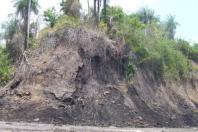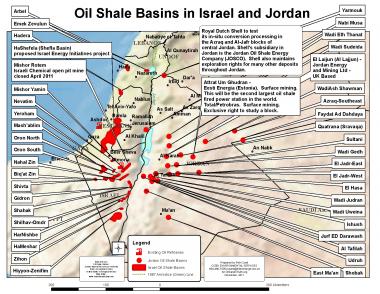Jordan
The plot:
Jordan has virtually no conventional oil and gas reserves, unlike most other nation-states throughout the Middle East. The Hashemite Kingdom, however, does contain very large reserves of kerogen-based oil shale deposits, many of which are likely recoverable. Corporations are using Jordan as a test case technologically speaking, as what would be large strip mines and in-situ operations for synthetic crude oil, alongside huge power plants for electricity are now planned across the Kingdom. Chinese, Canadian, Brazilian and Estonian know how are all included in current plans for this development in a country with the second weakest potable water supply on the planet.
The details:
Multiple deposits
40 to 80 billion tonnes of oil shale (uses proposed include both electricity and crude oil; approximately 34 billion barrels of potential synthetic crude).
Mining and In-Situ extraction methods proposed; retorting kerogen as well as burning directly at a power plant for electricity. Mining is the proposed method of extraction at both the large oil from shale operation run by KIO as well as for the feedstock of what is proposed to be the largest power plant operated by shale in the world outside of Estonia.
Corporations involved:
Karak International Oil [KIO], a subsidiary of Jordan Energy and Mines Limited [JEML] (UK)
Jordan Oil Shale Company [JOSCO], a subsidiary of Royal Dutch Shell (UK)
Eesti Energia (Estonia)
TOTAL (France)
Petrobras (Brazil)
Global Oil Shale Holdings (Canada)
Sinopec of China has completed previous work; since terminated.
Saudi Arabian, Russian, UAE and Jordanian energy companies have also established contracts with Jordan for longer term projects.
The KIO project alone is predicted to produce 15 000 bpd in the next coming years, with production maximizing at 60 000 bpd; Eesti Energia has plans for 36 000bpd; JOSCO has committed to producing oil from shale rock commercially in the future; Eesti Energia will also burn shale rapidly in the electrical power plant slated to burn shale as feedstock.
Near Karak are Bedouin communities who still rely on wells for water and do not have a treated or collected supply. Jordan is one of the driest countries on earth. The Gulf Co-operation Council is integrating Jordan (along with Morocco) into the oil producing, pro-US monarchy trade organization. Possibility remains that the electricity generated by Proposed shale power plants may help construct a nuclear power plant, further straining water supplies yet again.
Having Estonian and Brazilian interests alongside what is proposed to become the largest oil shale-fired power plant outside of Estonia has situated Jordan as a frontier in extreme energy; global expansion of oil shale for electricity or mock crude constructed on the Petrosix or Enerfit model has Jordan as a starting point. The Red-Dead canal may end up involved in long term energy planning around shale, with normalization of relations with Israel being helped by Jordanian oil shale developments being constructed near Palestinian refugee camps as well as traditional Bedouin areas.



